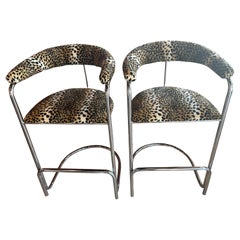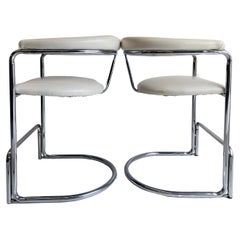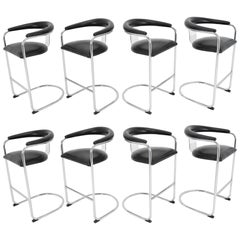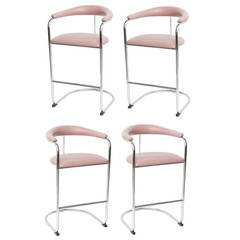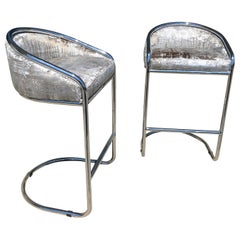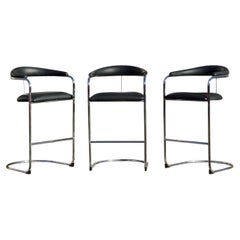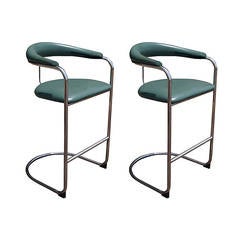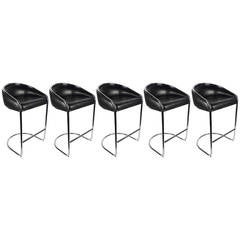Bar Stools Lorenz
Vintage 1970s American Mid-Century Modern Stools
Chrome
Vintage 1980s North American Post-Modern Stools
Steel, Chrome
Mid-20th Century American Mid-Century Modern Stools
Chrome
Vintage 1930s Austrian Bauhaus Stools
Chrome, Steel
Vintage 1980s American Mid-Century Modern Stools
Chrome
Late 20th Century North American Bauhaus Stools
Chrome
Late 20th Century North American Bauhaus Stools
Chrome
Vintage 1960s Austrian Mid-Century Modern Stools
Chrome
20th Century Unknown Stools
Chrome
Mid-20th Century American Mid-Century Modern Stools
Chrome
Vintage 1980s North American Mid-Century Modern Stools
Steel, Chrome
Late 20th Century Austrian Mid-Century Modern Chairs
Chrome
Late 20th Century Italian Mid-Century Modern Stools
Chrome
Bar Stools Lorenz For Sale on 1stDibs
How Much is a Bar Stools Lorenz?
A Close Look at Modern Furniture
The late 19th and early 20th centuries saw sweeping social change and major scientific advances — both of which contributed to a new aesthetic: modernism. Rejecting the rigidity of Victorian artistic conventions, modernists sought a new means of expression. References to the natural world and ornate classical embellishments gave way to the sleek simplicity of the Machine Age. Architect Philip Johnson characterized the hallmarks of modernism as “machine-like simplicity, smoothness or surface [and] avoidance of ornament.”
Early practitioners of modernist design include the De Stijl (“The Style”) group, founded in the Netherlands in 1917, and the Bauhaus School, founded two years later in Germany.
Followers of both groups produced sleek, spare designs — many of which became icons of daily life in the 20th century. The modernists rejected both natural and historical references and relied primarily on industrial materials such as metal, glass, plywood, and, later, plastics. While Bauhaus principals Marcel Breuer and Ludwig Mies van der Rohe created furniture from mass-produced, chrome-plated steel, American visionaries like Charles and Ray Eames worked in materials as novel as molded plywood and fiberglass. Today, Breuer’s Wassily chair, Mies van der Rohe’s Barcelona chair — crafted with his romantic partner, designer Lilly Reich — and the Eames lounge chair are emblems of progressive design and vintage originals are prized cornerstones of collections.
It’s difficult to overstate the influence that modernism continues to wield over designers and architects — and equally difficult to overstate how revolutionary it was when it first appeared a century ago. But because modernist furniture designs are so simple, they can blend in seamlessly with just about any type of décor. Don’t overlook them.
Finding the Right Chairs for You
Chairs are an indispensable component of your home and office. Can you imagine your life without the vintage, new or antique chairs you love?
With the exception of rocking chairs, the majority of the seating in our homes today — Windsor chairs, chaise longues, wingback chairs — originated in either England or France. Art Nouveau chairs, the style of which also originated in those regions, embraced the inherent magnificence of the natural world with decorative flourishes and refined designs that blended both curved and geometric contour lines. While craftsmanship and styles have evolved in the past century, chairs have had a singular significance in our lives, no matter what your favorite chair looks like.
“The chair is the piece of furniture that is closest to human beings,” said Hans Wegner. The revered Danish cabinetmaker and furniture designer was prolific, having designed nearly 500 chairs over the course of his lifetime. His beloved designs include the Wishbone chair, the wingback Papa Bear chair and many more.
Other designers of Scandinavian modernist chairs introduced new dynamics to this staple with sculptural flowing lines, curvaceous shapes and efficient functionality. The Paimio armchair, Swan chair and Panton chair are vintage works of Finnish and Danish seating that left an indelible mark on the history of good furniture design.
“What works good is better than what looks good, because what works good lasts,” said Ray Eames.
Visionary polymaths Ray and Charles Eames experimented with bent plywood and fiberglass with the goal of producing affordable furniture for a mass market. Like other celebrated mid-century modern furniture designers of elegant low-profile furnishings — among them Ludwig Mies van der Rohe and Finn Juhl — the Eameses considered ergonomic support, durability and cost, all of which should be top of mind when shopping for the perfect chair. The mid-century years yielded many popular chairs.
The Eameses introduced numerous icons for manufacturer Herman Miller, such as the Eames lounge chair and ottoman, molded plywood dining chairs the DCM and DCW (which can be artfully mismatched around your dining table) and a wealth of other treasured pieces for the home and office.
A good chair anchors us to a place and can become an object of timeless appeal. Take a seat and browse the rich variety of vintage, new and antique chairs on 1stDibs today.
- 1stDibs ExpertNovember 2, 2021The most comfortable bar stool is a matter of preference. There are many different types of bar stools for your house, and many different comfy versions have been developed over time. To select the best one, we suggest thinking about height, weight, design and fabric so you can find the best set for your preferences and budget. Shop a collection of antique, vintage and contemporary bar stools from some of the world’s top dealers on 1stDibs.
- 1stDibs ExpertFebruary 22, 2021The height of a bar stool is typically around 28 to 38 inches tall. This is because bar tops are usually around 40 to 42 inches high, so bar stools need to be under this height in order to provide ample leg room.
- Why is it called a bar stool?1 Answer1stDibs ExpertNovember 13, 2024Why it is called a bar stool has to do with where you typically place this type of furniture. Usually featuring seat heights of 28 to 33 inches, these chairs situate a user at a comfortable level to eat and drink at a bar, whether in a home or in a restaurant. Bar stools are taller than seating intended for use at kitchen counters, known as counter stools, which usually have a seat height of 24 to 27 inches. On 1stDibs, find a diverse assortment of counter stools.
- 1stDibs ExpertApril 5, 2022Yes, bar stools are taller than counter stools. The average height of counter stools is 24 inches, and they are best suited for counter height tables and kitchen islands. Barstools are typically an additional five to six inches taller to fit the height of traditional bar counters. Shop a wide selection of bar stools and counter-height stools on 1stDibs.
- 1stDibs ExpertApril 26, 2024The difference between bar stools and counter stools comes down to height. Bar stools are usually between 28 and 32 inches tall to provide comfortable seating at bars and bar-height tables. To pair with kitchen counters and counter-height tables, counter stools are normally 24 to 27 inches tall. Find a large collection of dining stools on 1stDibs.
- 1stDibs ExpertFebruary 21, 2023Whether saddle bar stools are comfortable is largely a matter of personal opinion. However, some people find the curved seats featured on these stools supportive because they conform to the body's contours. Find a variety of saddle bar stools on 1stDibs.
- 1stDibs ExpertApril 5, 2022A standard bar stool will sit around 29 to 32 inches high, and extra-tall bar stools will sit around 33 to 36 inches high. To ensure the best fit for your space, measure the height of the bar or table you want to accent. Shop a wide selection of bar stools on 1stDibs.
- 1stDibs ExpertApril 5, 2022The comfort of a rattan bar stool is really a matter of preference. Some styles are crafted with a back or cushion for additional comfort, while some may support the addition of a cushioned seat. On 1stDivs, find a range of rattan bar stool styles to suit any preference.
- 1stDibs ExpertSeptember 25, 2019
Since counters are generally 34 to 39 inches high, counter stools should be 24 to 27 inches tall; bars are 40 to 46 inches from the ground, so bar stools typically stand 30 to 36 inches tall.
- 1stDibs ExpertApril 5, 2022Counter height bar stools are stools that typically have a seat around 24 inches to 27 inches high and are designed to provide seating along a bar or at counter height tables. On 1stDibs, find an array of counter height bar stools from top sellers.
- 1stDibs ExpertFebruary 13, 2023The best wood for bar stools is largely a matter of personal preference. Walnut, oak, cherry and birch are commonly used materials. On 1stDibs, find a selection of bar stools from some of the world's top sellers.
- 1stDibs ExpertMarch 22, 2022To identify Marcel Breuer bar stools, start by examining the frame. Genuine models will usually feature smooth, welded ends. Most reproductions have end caps instead. You can also look for a sticker that bears the model name on the underside of the seat. On 1stDibs, find a range of expertly vetted Marcel Breuer bar stools.
Read More
The 21 Most Popular Mid-Century Modern Chairs
You know the designs, now get the stories about how they came to be.
Eileen Gray’s Famed Cliffside Villa in the South of France Is Returned to Its Modernist Glory
After years of diligent restoration, E-1027, the designer-cum-architect’s marriage of romance and modernism, is finally complete.
See How New York City Designers Experiment on Their Own Homes
There are many lessons to be learned from the lofts, apartments and townhouses of architects and decorators in Manhattan and beyond.
Why Drew McGukin’s Colorful Home Differs from Those of His Clients
The New York–based designer has a high-impact style that's all his own, as his loft in the Chelsea Flower District makes abundantly clear.
Jeff Andrews Captures Old Hollywood Glamour in His Cinematic Spaces
Having created extravagant homes for reality TV’s biggest stars, the designer is stepping into the spotlight with his first book.
New Orleans’ Lee Ledbetter Makes Design Magic by Mixing Past and Present
The Louisiana-born and -bred architect talks to 1stdibs about the art of making timeless places that matter.
How a Modernist Hamptons Home on the Water Became the Ideal Weekend Refuge
Damon Liss and Stelle Lomont Rouhani Architects collaborated on this serene getaway for a minimalism-minded Manhattan family of four.
Desert Modern Designer Arthur Elrod Finally Gets His Day in the Sun
The Palm Springs interior decorator developed a mid-century style that defined the vacation homes of celebrities and other notables, including Bob Hope and Lucille Ball.
